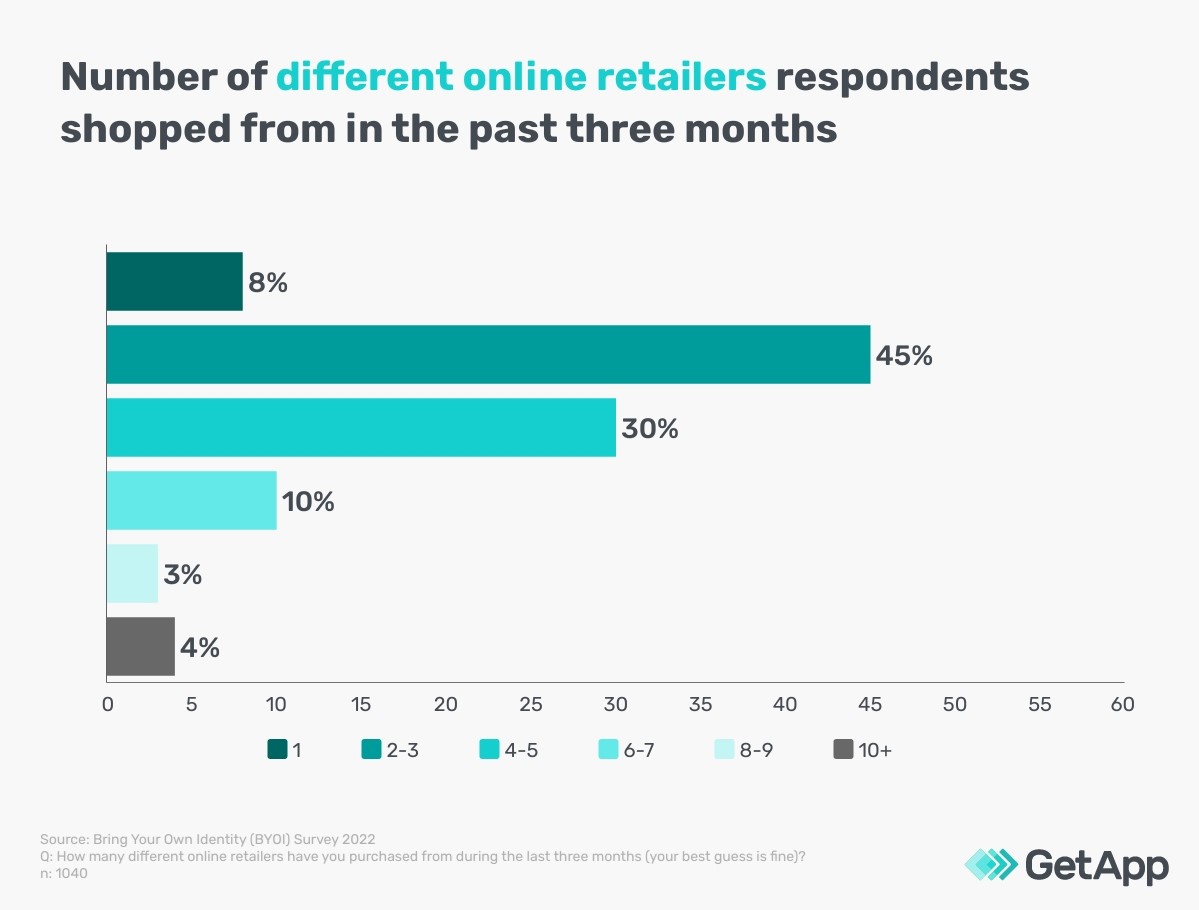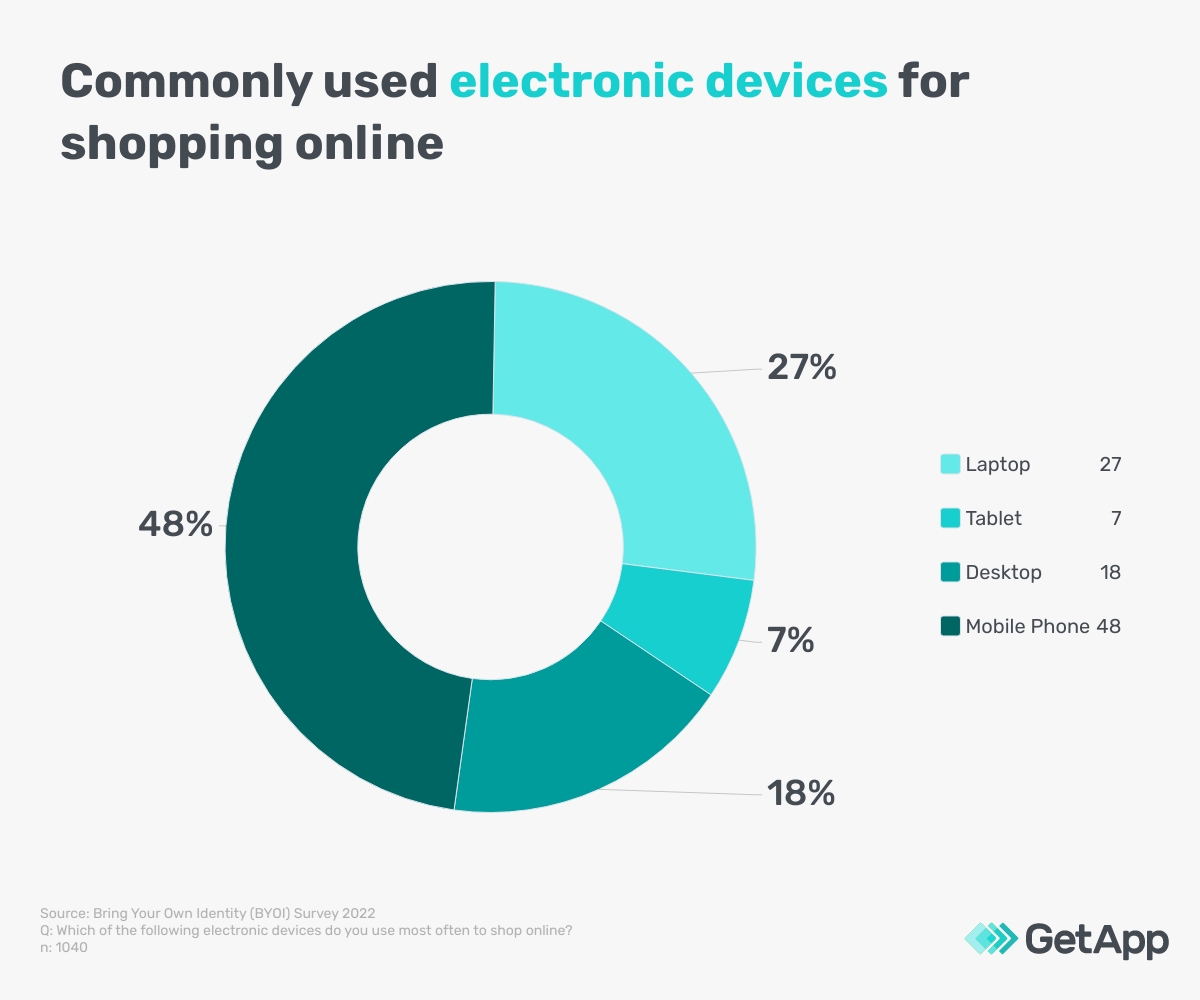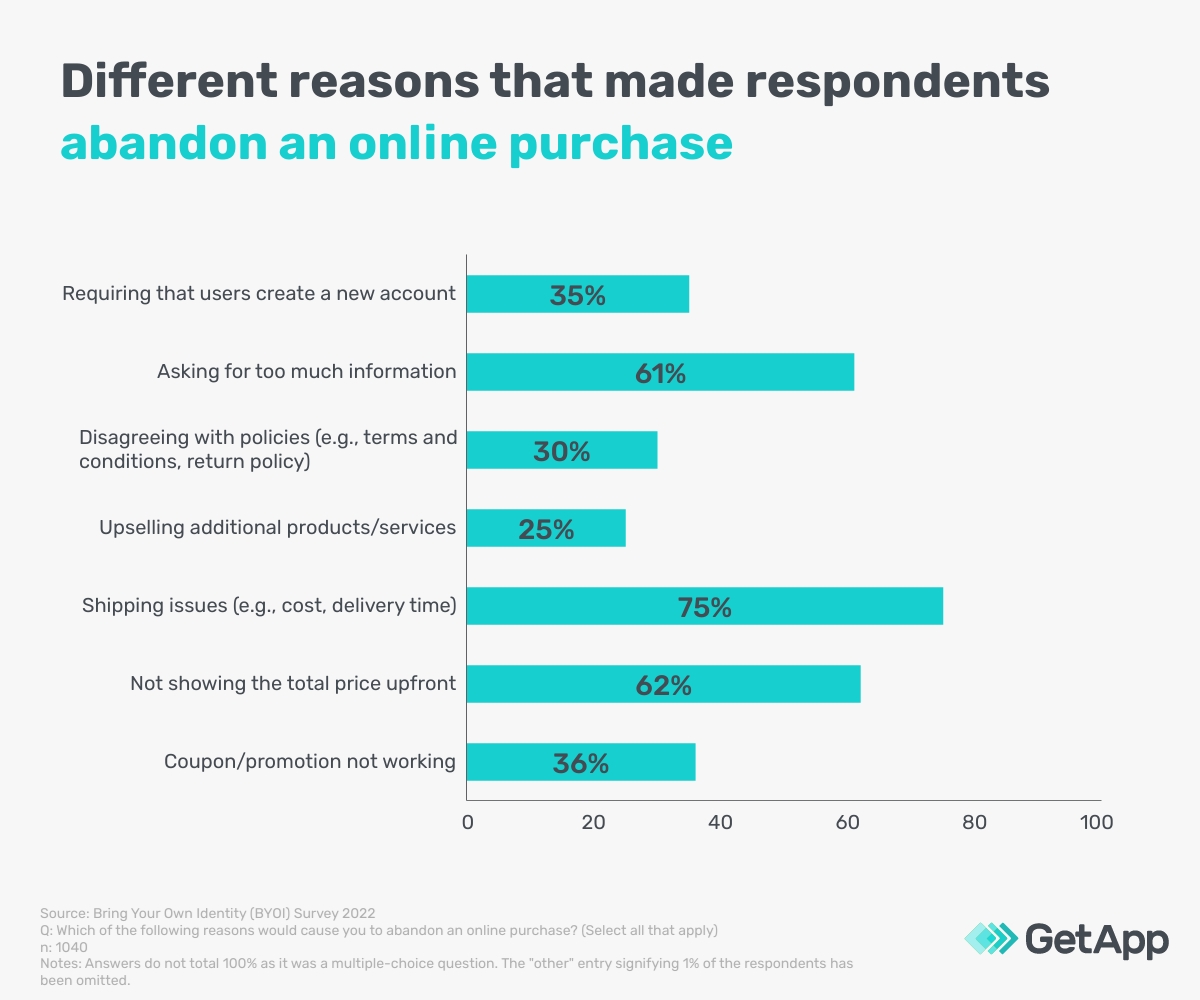The demand for the eCommerce market might have evolved with people switching to digital channels for everyday tasks. This study aims to understand Australian customers’ behaviour towards online shopping. Further, it also investigates why consumers potentially abandon an online purchase.

In this article
- Half of the respondents shop online at least once per month
- Mobile phones are the most used devices for online shopping
- 61% use personal email accounts for online shopping
- 71% of respondents decided not to shop due to privacy concerns
- Complicated registration can lead to cart abandonment
- Spotlight on the future of online shopping
Over the last few years, eCommerce might have become an essential part of the global market. In addition, ‘the market size of the online shopping industry in Australia has grown 20.2% per year on average between 2017 and 2022’. This data indicates that more people are increasingly opting for online shopping. But, what is the frequency of this shopping behaviour? What device is being used the most, and what reasons have prompted people to let go of their cart at the very last moment?
To find out about customer behaviour in Australia regarding online shopping, we surveyed 1,040 online shoppers who shop online at least once per month to learn about their purchase patterns and experience. The full methodology for the survey can be found at the bottom of this article.
Half of the respondents shop online at least once per month
Online shopping has gained significance over time. Our survey results indicate that 50% of respondents shop online at least once per month. Out of the other responses we received, 42% of them shop online at least once weekly. Such data proves that online shopping practices might be actively progressing and, therefore, businesses may be looking to invest more in such platforms. The potential reasons for this online shopping frequency could be:
- People may find it more convenient to shop from the comfort of their homes
- Typically, they can take their time to select preferred products from various brands
- Overall, online shopping helps do away with standing in long queues for payments
- People can check online reviews posted by other shoppers to ensure a particular product is worth buying
- Online shopping sites typically function 24/7, providing time flexibility to people shopping online
In addition to this, GetApp asked survey-takers about the number of different online retailers they have purchased from during the last three months, and these are the responses:

The data clearly shows that 45% of the respondents have shopped from two to three different online retailers during the last three months. In a significant proportion of cases, the survey-takers can be seen sticking to this number and not going for too many different online retailers. Only 4% of them selected the option of having shopped from more than ten online retailers over the last three months.
A previous GetApp survey on buy now/pay later practices shows that ‘ 54% of online shoppers only use trusted online retailers’. The possible reasons for the respondents choosing the same retailers could be service quality, product quality, quick delivery, reasonable shipping charges, and helpful customer service.
Mobile phones are the most used devices for online shopping
The use of mobile phones is potentially on the rise, and a Statista report says that the Australian mobile commerce market can grow by over US$20 billion by 2023. Keeping this in mind, GetApp’s survey found that mobile phones are the most often used electronic devices for online shopping, followed by laptops, desktops, and tablets.

It can be distinctly identified that almost half (48%) of the respondents prefer using mobile phones for shopping online. In comparison, tablets —with only 7% of survey-takers using them— are the least popular option among all other electronic devices. Additionally, the previous GetApp survey —mentioned above— indicated that ‘consumers are happy to opt for the smaller gadget over a computer, as 53% of survey-takers said they used the smartphone the most when online shopping’.
61% use personal email accounts for online shopping
Delving more into understanding the purchase patterns of the respondents, we asked about their preference regarding the usage of burner email accounts while shopping online. Surprisingly, most of the respondents (61%) do not use a burner email account but prefer using personal email for online shopping.
A burner email account is a disposable or temporary account that people generally don’t use for important personal or professional purposes. Some people may create a burner email account due to privacy concerns. They can dispose of it anytime without messing up their personal email account. For instance, a burner email account could help when a customer wants to know the product details and its reviews on a website but can’t get through without registering via email.

Using personal email accounts almost every single time while shopping online might also attract identity-based attacks. For instance, if a customer uses the same email address and password for shopping online with different retailers, fraud may occur. Even a report by the Australian Bureau of Statistics shows that ‘ people were most commonly exposed to a scam over the phone (38% or 7.8 million) or by email (32% or 6.5 million)’. In such a scenario, if a customer has different email addresses for different online websites, a potential breach in one account might not necessarily translate to a breach in all other email accounts.
Majority use the same password for multiple online accounts
A combined total of 60% of respondents said they use the same passwords for multiple account accounts, while 40% of them never do any such thing. The data may indicate that some respondents find it difficult to remember different passwords for several online accounts. Can the concept of bring your own identity (BYOI) help in such a scenario?
What is BYOI?
BYOI is a concept where a third party manages a user’s credentials. This concept can usually be helpful for customers who find it difficult to remember different passwords for multiple online accounts. BYOI can help users register and log in to services using pre-existing credentials. For example, a website can allow users to log in using their existing identities on Google, Facebook, or Twitter instead of creating a new username and password every time, and then registering.
71% of respondents decided not to shop due to privacy concerns
Moving forward to understanding customers’ concerns regarding online shopping, we asked survey-takers if they’ve ever decided against buying a product online due to privacy issues. Unsurprisingly, a combined total of 71% of respondents said they have opted out of online purchases because they didn’t trust the company with their personal information —with 23% of them having done it once and 48% more than once.
The data indicates that privacy concerns have made most respondents decide against an online purchase. This might also be a focal point for online businesses offering products and services to their customers. Companies should ideally adhere to data privacy policies, safely handle their customers’ information, and comply with the law.
What can businesses do to protect customer privacy?
As per the Office of the Australian Information Commissioner (OAIC), the privacy rights of Australians are protected by the Privacy Act 1988, which deals with their privacy rights and how organisations and agencies should handle their personal information. Apart from this, businesses can take ownership of protecting consumer privacy in other ways, including the following:
– Creating a cyber breach incident response plan: businesses should ideally create a structured plan in case a data breach happens. The plan should include measures and instructions on how to act in case of a security incident such as a data leak, ransomware attack, or loss of confidential information. A well-structured plan would include steps such as preparation of the plan, detection of the problem, analysis of the situation, eradication of the problem, and recovery of data or information.
– Asking for consumer consent while collecting information: organisations should ask for consumers’ consent regarding the information they want to share online.
– By undertaking a privacy impact assessment (PIA): a PIA is prepared by the OAIC and can help businesses assess a project that may impact an individual’s privacy.
Complicated registration can lead to cart abandonment
Apart from privacy issues, complicated registration processes also made respondents decide against an online purchase in most cases. A combined total of 76% of them decided against making an online purchase because the account registration process was too complicated, with 54% and 22% saying this happens occasionally and often, respectively. Other reasons that caused respondents to abandon their online purchases were as follows:

Shipping issues is the most chosen factor for cart abandonment
When we asked survey-takers to indicate the reasons that would cause them to abandon an online purchase, shipping issues (75%) was their biggest concern, followed by not showing total prices upfront (62%), and websites asking for too much information (61%).
Talking about shipping issues, the significant points of concern could be the shipping costs and the delivery time. Businesses can use different ways to handle shipping-related cart abandonment challenges, such as offering a choice of varied shipping partners, providing detailed shipping information including delivery speed, updating shipping charges in real-time, and offering free shipping if possible.
In addition to this, other customer concerns and queries before and after making an online purchase could be:
- The difference between the perceived and the actual product received
- Reliability of online product reviews
- Accuracy of delivery tracking systems
- The potential fear of failure of digital payments
- Complicated return and exchange policies
What are the different consumer rights available to people when they shop with an Australian online business?
According to the Australian Competition and Consumer Commission (ACCC), ‘all your usual consumer rights apply when you shop with an Australian online business’. Companies selling goods and services online should ensure product quality, not hide costs, provide a variety of product choices, quote a fair price, ensure timely repair, refunds, and more. Such rights may also apply when consumers purchase from an online business overseas. However, customers may find it challenging to get a refund, exchange, or repair from a business outside Australia.
Spotlight on the future of online shopping
The overall result of our survey points out that consumers prefer online shopping mostly with trusted retailers and when their privacy concerns are taken care of. Moreover —to lower the cart abandonment rate— businesses may want to focus more on customer satisfaction, remain transparent regarding prices, streamline their registration process, and take care of other shipping concerns. Companies that are well aware of and understand the different concerns of their customers during and after an online shopping journey may be more likely to provide valuable services and gain trust.
In the second part of our two-part series, we will discuss consumer preferences regarding guest checkouts while shopping online.
Methodology
To collect data for this report, GetApp conducted an online survey in June 2022 gathering the participation of 1,040 respondents. The selection criteria for participants is as follows:
- Australian residents
- Over 18 and below 75 years old
- Shop online at least once per month
For the buy now/pay later survey that GetApp conducted in April 2022 with 1,002 respondents, the selection criteria was as follows:
- Australian residents
- Aged over 18 years old and under 75 years old
- Employed by a company with under 250 employees
- Shop online at least once every month
NOTE: This document, while intended to inform our clients about the online shopping behaviour of customers, is in no way intended to provide legal advice or to endorse a specific course of action. For advice on your specific situation, consult your legal counsel.
